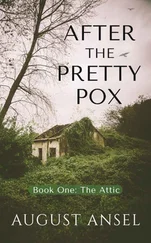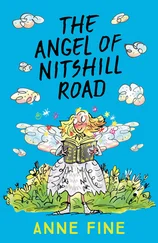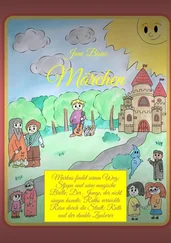Handy laid a hand against the outside wall, resting his forehead there, and Arie did likewise. No vibration, no sound, no prickling sense of life on the other side. Handy gave a minute shake of the head—nothing.
Curran stepped aside, and Arie inched out to have a look. A double row of white river rocks outlined a neat path that curved from the shed entrance, disappearing around the corner and out into the yard. The door of the shed was on that far side, not visible from the cabin. Arie didn’t hesitate. The thin metal doorknob, dented and rusty, spun uselessly in her hand. Curran put a shoulder to the bowed wood. He shoved once and it popped open, sticking a bit at the top with a low shudder. Talus appeared and eeled past, like a dog coming home after a long walk. Arie followed. Curran and Renna slipped inside, and Handy brought up the rear, leaving the door slightly ajar.
It was a small space, about six feet square, and although there was a smell of old timber, lightly mildewed, it wasn’t much—not the odor of wet decay Arie’d expected. The inner walls were finished—painted paneling over drywall—and the floor was covered with a sheet of blue and white linoleum. On the wall opposite the door, a waist-high workbench was strewn with a jumbled assortment of plastic and terracotta pots, desiccated flower bulbs, a rusted can sprouting a splayed bouquet of flat-handled paintbrushes. Wood screws, washers, and bent nails were sprinkled in random disarray over the bench’s surface. Renna and Handy at once commenced to rummage through the cupboards and drawers set above and below the bench, creating a scanty pile of usable items between them.
To the left was a window that overlooked the clearing. Sidling toward it at an angle, Arie stole a glance. Then she stared, utterly charmed.
The cabin ran to riot at the edges, where dead wisteria vines planted near the porch now climbed onto low-hanging tree branches. At the base of the steps a potted bamboo had burst from a rotted whiskey barrel planter and bolted into a wild, leafy screen that towered twice the cabin’s height. The front porch was set deep, under a shallow dome of hammered metal.
Three windows, none matching, faced the shed. One of them, tall and narrow, was fixed next to the door like a sidelight. A large, diamond-shaped window with multiple small panes was located by the rear corner of the cabin. Near the crossbeam of the roof was a piece of stained glass with a pastoral of meadow and stream, sheep and bird—so elaborate it might have come from a medieval cathedral.
What captured her attention most, though, were the cabin’s outer walls. They were completely covered with metal scales, overlapped like an outlandish fish. Green, blue, and silver swirls were punctuated here and there by a red or yellow counterpoint—a design that might have been conceived in a state of chemical ecstasy. Someone had shingled the small cabin with hundreds of flattened aluminum cans.
Curran stood sentinel at the door, stroking Talus’s boney forehead with his big, blunt fingers while Arie let her eyes linger awhile on each of the cabin’s windows. No movement. No one standing where she could see them. No hint of smoke at the chimney. Still as stone, inside and out. But, as Curran had told them in the cave, there was something… something that put her wind up. What?
After a moment or two, it dawned on her. Despite the wild growth of wisteria and bamboo; regardless of the moss and lichen embedded in the shed’s outer walls; and no matter the tattered, dirty spiderwebs that festooned those whimsical windows—there was too much order here. The stone-trimmed path that led away from the shed’s door bisected the clearing and ended at the cabin’s front porch. And, although the rest of the yard was scattered with normal forest debris, inside its perimeters the path was downright tidy. The fine hairs on her arms stood up.
Far to the left, almost out of her range of vision, Arie saw a tiny building nearly swallowed by the dense brush. She squinted, then realized what it was: vent pipe up top, classic crescent moon carved into the door. Outhouse. There was no stone-trimmed path leading to it, but between the back corner of the cabin and the privy was a faint, unmistakable trail in the tallish grass, a barely perceptible line where someone’s feet and legs had pushed the blades apart in transit.
Someone moved inside the house.
If the day had been bright enough to reflect against the glass, she would have missed the slight flicker. But she caught it in the narrow window next to the door, the briefest suggestion of shoulder, elbow, wrist, there and gone in the space between seconds. Someone slender, not tall, not muscular.
Arie dropped below the edge of the windowsill so quickly she might have been thrown to the linoleum by an invisible hand. Renna and Handy ducked, too, eyes wide, bodies tense. Curran was already down, hunkered near the door next to Talus.
“The window by the porch,” she said. “A woman, maybe.”
Renna’s hand went to the knife in her belt. “Did she see you?”
“If I saw her, it’s likely.”
“Now what?” said Curran. “We can’t know how many might be in there. I don’t want to sit here while they get ready to set this shed on fire.”
The strangest sensation washed over Arie. It was she inside the cabin, drifting behind the windows, on guard, waiting for the intruders—the usurpers—to leave. “No,” she said. “You felt watched here yesterday. That’s what you told us. Yet you managed to walk out with a load of provisions.” She shook her head. “If there was a group, they’d surely have stopped you. Tried, at the very least.”
“We need shelter,” said Handy.
“Not by force.”
Curran closed his eyes and made a sound of quiet frustration. “We’re wasting time. It’ll be dark in an hour.”
“Sister,” Handy said, “He’s right. We have to push this.”
She was still in that odd state of déjà vu, back in her attic refuge the night Handy had brought Renna inside, into the rooms of ruin, determined to find aid and shelter for the wounded girl. “How, then?” she said.
“If they saw you just now, they’ll be focused here. Curran and I will get in the trees and circle around either side. We don’t want someone bolting out the back, and if they make a move on the shed we can flank them. You and Renna stay here with Talus.”
“Yes,” said Curran. “Give us a count of sixty.”
“Come here, girl.” Renna held out her hand. Talus looked at Curran first, then meandered to Renna with complete canine nonchalance, looking back once at the open shed door.
“On our sign, hail the cabin,” Handy told Arie. “Start them talking. Get a feel.”
“And if they don’t respond?”
“Then we’ll see what we see.”
The two men hovered at the door. The sharpened walking stick Handy had made—one for each of them—was on Curran’s back, handle within easy reach. He also carried a brutish pipe wrench, scavenged during their stay at the grower’s mansion, its jaw open to create a wicked hook. Handy carried only his knife, choosing to leave behind his large bow. Curran slipped out first, in a half-crouch. Talus whined once, and Renna hooked a finger under her collar.
Handy cupped Renna’s chin and kissed her. “Sixty count.” He followed Curran. For a moment their voices murmured at the back wall of the shed, then their footsteps disappeared into the woods, one set gone to the left, one to the right.
Arie and Renna sat on the clean blue and white floor, eyes on each other, bodies tensed. Renna counted. Arie thought what she might say to the shadow in the cabin. Renna kept whispering the numbers. The apparition of their last day in Granny’s house dropped over Arie again like a clammy sheet.
Читать дальше












